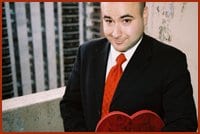Poet Kent Glowinski has a taste for blood, amputation, decapitation, rot and disease — in his work, that is. In person, he’s a brash contrarian, wryly goading to be sure, but there are no signs of the level of vulnerability — well, pain more than vulnerability — that urges the poems forward into a kind of thematic laceration.
Narcissistic Personality Disorder, Glowinski’s first book of poetry, is an extended meditation — howl might be the better word — on a bad break-up that’s left him cynical about the world.
“No, not the world,” he says. “Just men.”
He launches the title at 5:30pm Thu, Jan 24 at the Buzz (374 Bank St).
Glowinski won’t delve into the specifics of the relationship, but judging by his comments and a poem titled “Westmount lunch, Sept. 26, 1999”, readers can roughly triangulate the period in which the book is set (during his undergraduate years, before law school). All indications are that he and the Ex have been splittsville for a number of years.
So why produce and self-publish a book of poems about the Ex rather than just moving on?
“Let’s talk about moving on, because it pisses me off — because it’s just a way for people to get away with things.”
Glowinski cites Margaret Atwood as his primary influence, and the violence of his images are sometimes reminiscent of Atwood’s clinical dissections. But Glowinski’s heritage is more Sylvia Plath than contemporary Canadian tastes allow, utilizing archetypal images rather than Atwoodian specificity.
In some ways, Narcissistic Personality Disorder’s closest kin is Canadian poet and columnist Lynn Crosbie’s LIAR. But in LIAR, the poems’ villain is imbued with enough detail to highlight his sniveling, human weakness. Glowinski’s villain is subhuman both explicitly (through machine metaphor, and his refusal to use the restroom) and implicitly (via the absence of any redeeming qualities). The poems aren’t really about an external person as much as they’re about the narrator’s personal tragedy.
Revenge is a word that comes up a lot in conversation with Glowinski. He says that punishing exes is a way of “shaping behaviour” — which represents, obliquely, a kind of brotherhood.
“Revenge serves a societal role. Maybe you, Marcus, are the next person to date Mr Beautiful Ex of Kent and he’s a nice guy now,” he says.
This writer wasn’t convinced. Wounded relationships certainly have their place as a muse in the gay cannon, from Paul Verlaine’s relationship with Arthur Rimbaud (another influence, says Glowinski) to WH Auden’s with Chester Kallman. But the acknowledgement of human imperfection — that a person can be simultaneously loveable and flawed — which a writer like Auden incorporates into his worldview seems buried in all Glowinski’s pain.
Whatever you think of it, Narcissistic Personality Disorder is certainly ballsy.
Glowinski says he took his manuscript (which was, in addition to being written by a lawyer, edited by a team of lawyers) to conventional publishers but didn’t get much response. Rather than let it go, he decided to self-publish.
“What you find is that a lot of publishing houses are started and then they die. Or they’re literary welfare cases, 90 percent government money,” he says.
All of which sounds like it’s coming out of a conservative’s mouth, which turns out to be true, as anyone who has met Glowinski socially knows (a “classical conservative”, Glowinski insists, not a neo-conservative).
In the final third of the interview, Glowinski drops a tantalizing hint, musing that he might challenge a policy of the Governor General’s Literary Awards which prohibits self-published books from being nominated.
Which brings us back full circle to the beginning of the interview. I had read the book in pdf form, but soon after Glowinski appeared at the interview (at the Standard on Elgin), so did an autographed copy of the book. A gift.
There’s an inscription in the book, intended to refer to “getting back” at the Ex. I prefer to take it as a call to arms for young gays to begin self publishing.
“You have to move karma along sometimes,” it says.
Indeed.


 Why you can trust Xtra
Why you can trust Xtra


